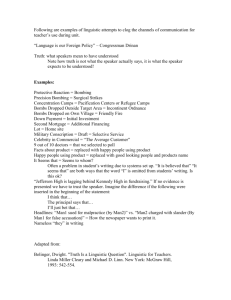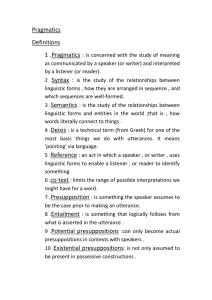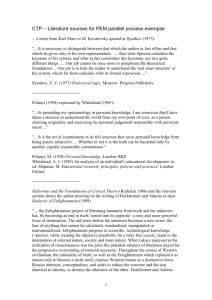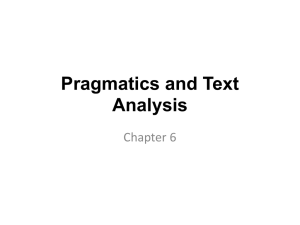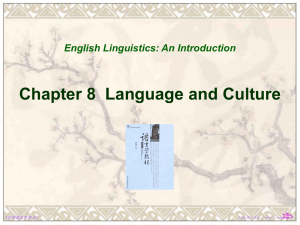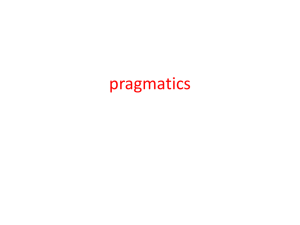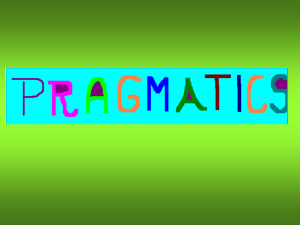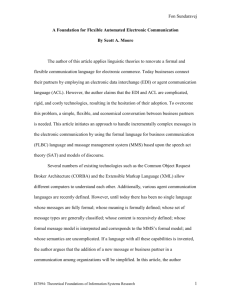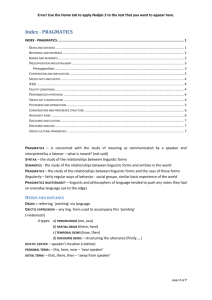Various Definitions of Pragmatics
advertisement
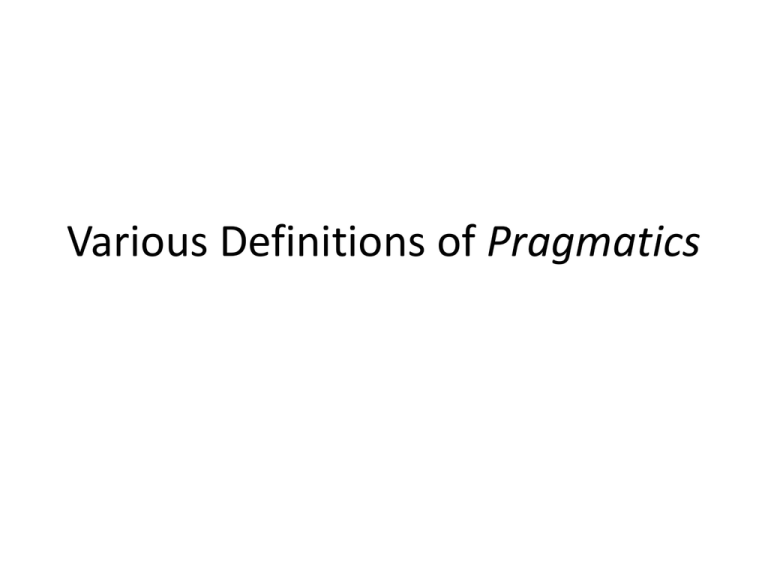
Various Definitions of Pragmatics Morris the study of the relations of signs to interpreters (1938) deals with the origin, uses, and effects of signs within the behaviour in which they occur (1946) Carnapp an investigation of meaning where explicit reference is made to the speaker, or, to put it more general terms, to the user of the language (1942) Levinson (1983) The study of those relations between language and context that are grammaticalized or encoded in the structure of language (p.9) The study of the relations between language and context that are basic to an account of language understanding (p.21) The study of the ability of language users to pair sentences with the contexts in which they would be appropriate (p.24) Leech (1983) Studies meaning in relation to speech situation (p.13) Thomas (1995) The study of “meaning in interaction” where meaning is interpreted as “not something which is inherent in the word alone, nor is it produced by the speaker alone, nor by the hearer alone …[because] [m]aking meaning is a dynamic process, involving the negotiation of meaning between speaker and hearer, the context of utterance (physical, social, and linguistic), and the meaning potential of an utterance. Green (1996) The study of understanding intentional human action …which must include belief, intention (goal), plan, and act (p.2) Yule (1996) Is the study of speaker meaning. Is the study of contextual meaning. Is the study of how more gets communicated than is said. Is the study of the expression of relative distance. Clark (1996) The study of language use …[which has to be viewed] as joint actions built on individual actions Verschueren (1999) The study of linguistic phenomena from the point of view of their usage properties and processes (p.1) Pragmatics does not constitute an additional component of theory of language, but it offers a different perspective (p.2) …[which includes] …cognitive, social, and cultural perspectives on linguistic phenomena in relation to their usage in forms of behaviour (p.7). Cruse (2000) [is] concerned with aspects of information (in the widest sense) conveyed through language which (a) are not encoded by generally accepted convention in the linguistic forms used, but which (b) none the less arise naturally out of and depend on the meanings conventionally encoded in the linguistic forms used, taken in conjunction, with the context in which the forms are used (p.16) Huang (2007) Is the systematic study of meaning by virtue of, or dependent on, the use of language. The central topic of inquiry of pragmatics include implicature, presupposition, speech acts, and deixes (2) Aziz (2010) The study of linguistic meaning as intended by speaker S and interpreted by hearer H, uttered in context C by using utterances U in language L. Included into context are setting, the world spoken of, and textual environment. Pre-requisites for a meaning to be interpretable reasonably: • Speaker S and hearer H must have such similar properties as being normal persons, reasonable, and having no personal idiosyncrasies. • Speaker S and hearer H must share a similar language of relative competence. • The dynamics of context are likely to be subject to cultural interpretations, and, in an attempt of deriving interpretations, it may involve prosody such as tone, intonation, and gestures. Isn’t it complicated what people have said about one effort, i.e Defining PRAGMATICS But…Don’t worry, mates!!! You are at good hands of the Pragmatics Ranger.
